Feeding Rabbits
Feeding
Rabbits: Rabbit feeding and nutrition info, plus different food needs for
different breeds and ages. Plus learn how rabbits get their own vitamins.
The following links will take you to pages all related to feeding rabbits:
What Do Rabbits Eat - Veterinary recommendations for feeding your pet and house rabbits.
Rabbit Nutrition - The technical among us (including me) might like to know exactly what are some nutritional needs of rabbits. This page is applicable to all rabbit owners, breeders and managers.
Rabbit Feed - Our review of a new rabbit pellet formulation on the market and now available online, plus info on what makes an excellent rabbit feed. Take the info and evaluate your own rabbit feed.
Bunny Branola - An all-natural rabbit conditioning supplement that supports lustrous fur, stress management, and digestive and immune health for all pet and livestock rabbits. Now produced exclusively by Raising-Rabbits because we are that impressed with it!
Bunny Branola - Ultimate Rabbit Nutritional Supplement, and Treat!
What rabbit wouldn't love Bunny Bran??!
One Tablespoon per day of our tasty and nutritious rabbit food supplement
sprinkled on their regular food is all your bunny needs to be happier and healthier.
- Bunny Branola makes fur softer and shinier, teeth and tummies healthier, and helps relieve stress due to things like barking dogs, new situations, or ultra cold winters.
- Bunny Branola is a wonderful rabbit superfood supplement for pregnant bunnies and growing bunnies.
Show
Rabbit Conditioning - Nothing so disappointing than to run
your hand over the back of a gorgeous rabbit and feel the knobby backbone, to
find a bunch of flabby folds around a rabbit's dewlap, or find a disastrously
blown coat on show day. Not all of these
situations are avoidable...but some are.
Don't raise show rabbits? No prob. You'll still get feeding-related tips for keeping any rabbit in the peak of health.
Show Rabbit Conditioning Part II will help you troubleshoot any problems you may have with conditioning your rabbits for show.
Feeding Baby Rabbits - Tips and techniques to care for and feed baby rabbits, should something drastic happen to the doe.
Feeding Wild Rabbits - Discover a formula and feeding program for orphaned baby rabbits. Designed to feed wild cottontails and jackrabbits, it is also appropriate for domestic rabbits, and will help you avoid the main threat to the lives of baby rabbits: enterotoxemia - bunny diarrhea.
Rabbit Food - Once upon a time, there was no such thing as rabbit pellets. Feeding rabbits without commercial pellets is definitely possible, with the correct know-how. If you can't obtain pellets where you live, or if pellets are too expensive, check out this page and see if there's a way to raise rabbits without pellets.
Pet-Safe Plants - Use this handy list to identify fruits, vegetables, plants, herbs, flowers and trees etc. that are safe to feed to your rabbits. Plus, we included a few safety tips on problematic plants.
Rabbit
Diet - we show you the exact diet we feed our Rex rabbit
show herd at Aurora Rex Rabbit Ranch.
"Feeding Your Rabbits"
World of Raising Rabbits E-Book
Feeding rabbits can be a very touchy thing. Too many carbs, and they can die of an inflamed bowel and disruption of the normal bacterial population in the gut.
Commercial pellets are expensive these days! But if you scrimp on the pellets, can you keep your rabbits healthy and fed?
We think yes! We did extensive research on plants and forages that can be fed to rabbits in place of or as supplementation of, commercial rabbit pellets. To the valuable info we discovered, we included the additional wealth of information contained here on Raising-Rabbits so you could have it ALL at your fingertips and off-line for your use when you need it.
Feeding Your Rabbits (With or Without Pellets)
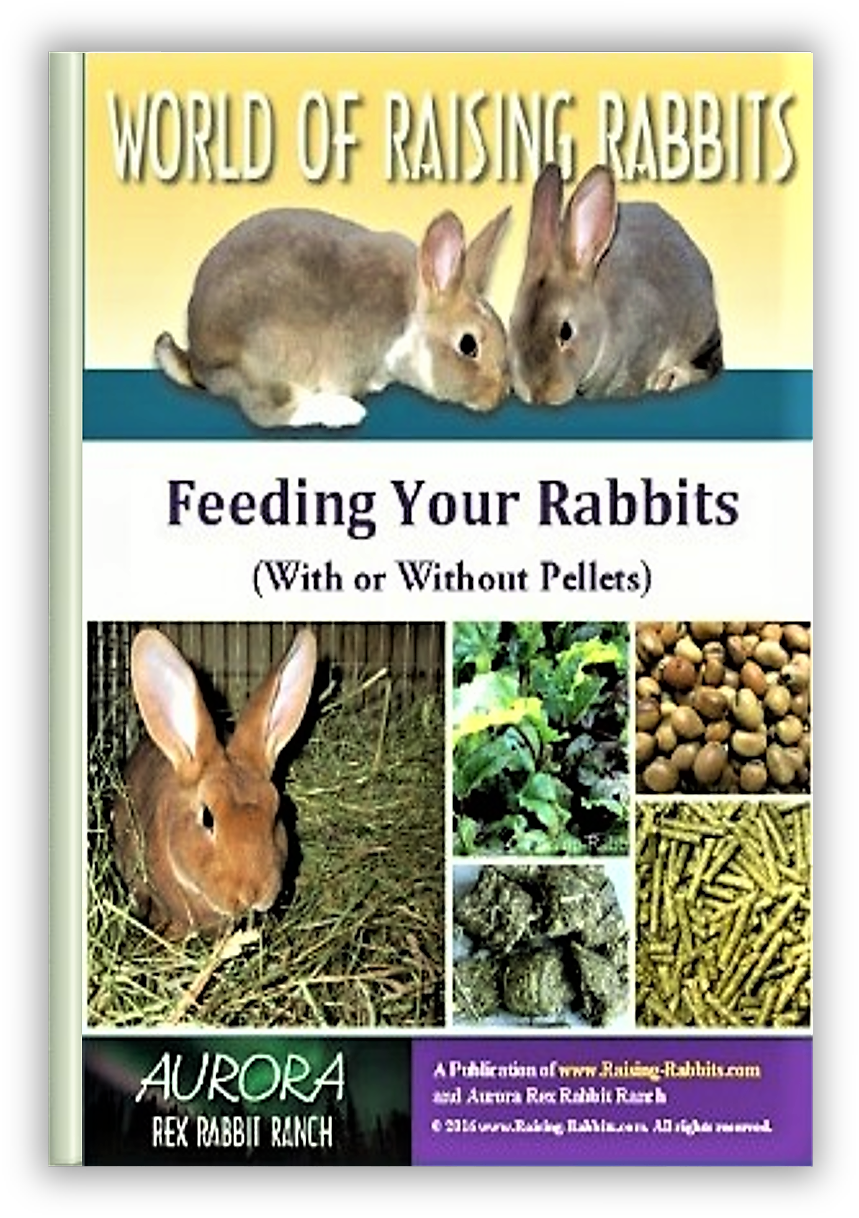
Feeding Your Rabbits is our guide on everything you need to know about a healthy rabbit diet. It includes information about store pellet feed or a home forage diet so you can choose the right fare for your hare.
Feeding Your Rabbits offers information about feeding your rabbits at all stages of life, including bottle feeding newborn babies, normal feeding of all your rabbits, extra nutrition for pregnant and nursing does, health-enhancing supplements, and much much more. It is useful whether you wish to supplement the normal commercial rabbit pellets, or you wish to completely replace those pellets.
A healthy diet really does help ensure your rabbit lives its best life.
Click here for more information, or...
Click here to purchase Feeding Your Rabbits With or Without Pellets!
Your purchase is 100% Risk Free. See our Double-Value Guarantee below.
Feeding
Rabbits:
Different Needs for Different Rabbits
Your program for feeding rabbits should be tailored to the rabbits' needs, as their needs may vary somewhat.
Pet and house rabbits:
The
adult pet rabbit requires only maintenance rations. Be extra careful to not feed too
many treats, no matter how much you love the rabbit. The greatest
danger to a pet rabbit, and most especially a spayed or neutered pet rabbit, may be obesity, which brings with it a
plethora of health dangers.
Wool rabbits:
Require high
protein to grow all that wool, plus more fats than commercial feed formulations typically include. The extra oils add conditioning to the wool, improving its quality.
Additionally these rabbits are more prone to potentially fatal wool block (impaction). Keep mineral oil, papaya enzymes and lots of grass hay at the ready in case the rabbit begins to go off feed.
Fur rabbits:
Producing a prime
pelt at age 6 months necessitates strong protein levels as well as fats, as per the angoras above. Plus, it is important to know when to lower the nutritional content of the feed so the rabbit
will hold the coat and not blow it in a molt.
Show rabbitries:
Show breeders
typically keep anywhere from a few, up to, say, 100 rabbits. Show rabbits respond quickly to the same type of feed rations that helps to condition fur rabbits - sufficient protein and particularly sufficient fats.
Meat rabbits:
A busy maternal meat rabbit
doe and her kits need high protein, but also critical is an adequate balance of
fiber for her health and that of her kits.
You definitely want to avoid a potentially fatal case of enteritis.
Growing young meat rabbits need up to 8% fats in their feed. Check your feed labels, and if necessary, offer black oil sunflower seeds, a teaspoon per day per rabbit, to their ration. The youngsters love it.
Large commercial herds:
The
pressure to make a financial go of the enterprise puts pressure on the manager
to produce an 8-week-old fryer rabbit that has gained sufficient weight for
market. All without pushing the doe too hard.
This requires a good feed-to-weight-gain ratio, and good management that
eliminates feed waste. (Wasted feed cuts into profits.)
The backyard meat rabbit set up:
Your family will get more meat out of your rabbits, or maybe less,
depending on how you feed and how healthy you can keep the rabbits. Feeding
rabbits adequate protein and fat levels will speed weight gain in the youngsters and recovery of conditioning in the lactating and pregnant does.
Chew Stix by Raising-Rabbits
Just the sticks your bunnies need for chewing and gnawing!
Fruit-infused Raising Rabbits Chew Stix are nature's blessings from the beautiful Washington State forests and orchards.
Fresh alder branches are harvested from trees grown without chemicals, pesticides, or smog. Those branches are then hand cut down to bunny size portions, and infused with apple from Washington’s famous apple farms.
Alder is perfect for rabbit dental hygiene! The apple taste and smell will attract your bun, and they can chew to their heart's content, saving your phone cords and your sanity.
Coprophagy
Coprophagy is defined as the act of consuming feces. You may have seen your rabbits doing this--they bend themselves around and nibble at their hind end. This is a hugely important nutritional behavior for rabbits - they're not usually cleaning, they're eating their 'vitamins,' so to speak.
A cecotrope is the technical term for the soft clusters of feces that come straight from the cecum. They look a bit like grape or raspberry clusters, are surrounded by a little membrane, and are rich in vitamins and bacterial protein.
Cecotropes give the rabbit important nutrients and vitamins which have been synthesized by gut bacteria, including Vitamin K and a plethora of B vitamins, including Vitamin B12. Scientists have put collars on rabbits so they couldn’t eat the stuff, and their nutritional status quickly declined.
Rabbits don’t eat the hard round ‘marbles,’ only the soft
clusters. And the rabbit only consumes
it directly from the hind end. If a
cecotrope should hit the ground without being eaten, the rabbit loses all
interest in it.
Mold is Not Good
Beware of moldy feed and hay - mold can kill rabbits. Take a tip from the hard-earned experience of Aurora Rex Rabbit Ranch and use your moldy hay or feed for garden mulch.
Moldy hay is downright dangerous. Old feed might look okay, but after about 3 months, the vitamins have degraded.
Signs of dangerously old feed:
- Commercial pellets become soft and easily break apart
- The feed turns into powder in the rabbits' feeders sometimes within 24 hours, even if the feed was still pelleted when you poured it into the feeder.
- You have trouble detecting much of a fresh smell in the pellets.
- Your rabbits are hungry, however they start scratching their pellets out of the feeder as though looking for something better to eat.
Age means there is time for even a little moisture to enter the feed bag and pellets. If so, the mold will begin to grow, and you might not realize it until your rabbits start getting sick, or even dying.
All of a sudden a lot of your rabbits can become sick. They may show some warning diarrhea, and if you're not alert, they could die from the mold toxins coupled with lack of nutrients.
It's not worth it to try to save money by using up and feeding rabbits old food or moldy hay.
Double-Value Guarantee
Our policy is to always OVER-deliver
on value,
which is why your purchase is fully covered by our
Double-Value
Guarantee.
Go ahead - take any of our e-books for a test drive. Peruse our detailed informational and educational e-books. Examine our plans for building rabbit cages, runs, or metal or PVC hutch frames. Check out the Rabbit Husbandry info e-books.
If you aren't completely satisfied that your e-book purchase is worth at least double, triple or even quadruple the price you paid, just drop us a note within 45 days, and we'll refund you the entire cost. That's our Double-Value Guarantee.
Note: When you purchase your
e-books, they will be in PDF format, so you can download them to any device that
supports PDF format. We advise making a back-up copy to a drive or cloud
account. If the books are lost, you can also purchase another copy from Raising-Rabbits.
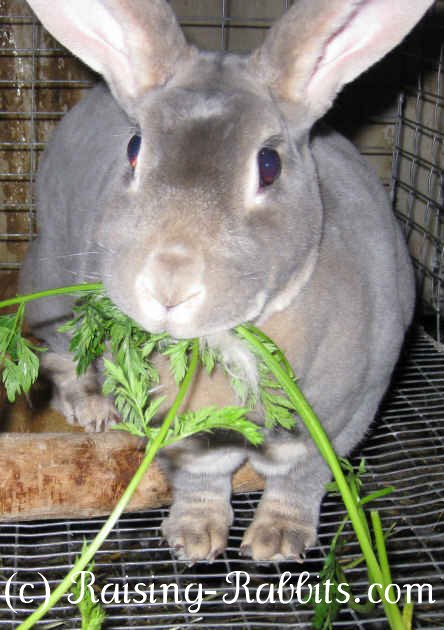
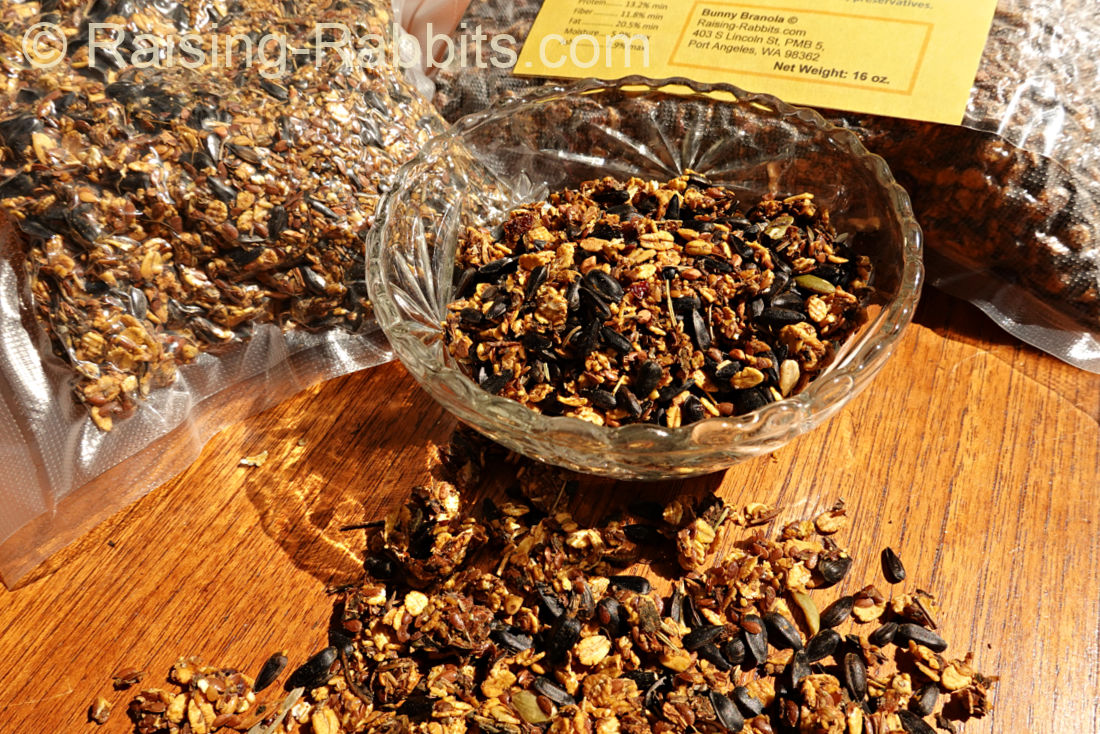
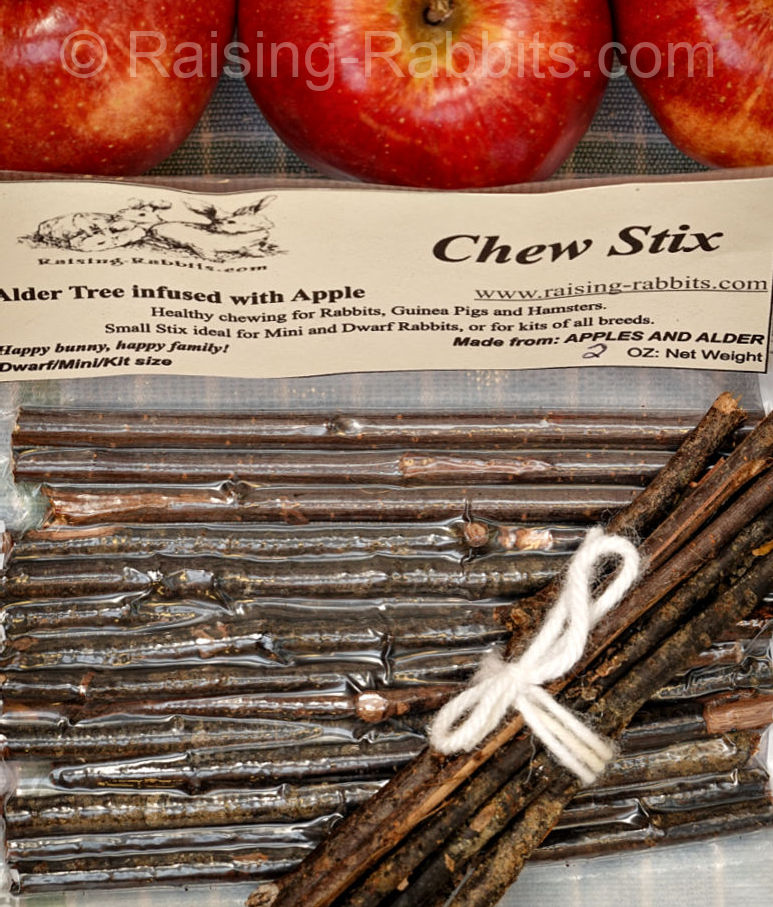
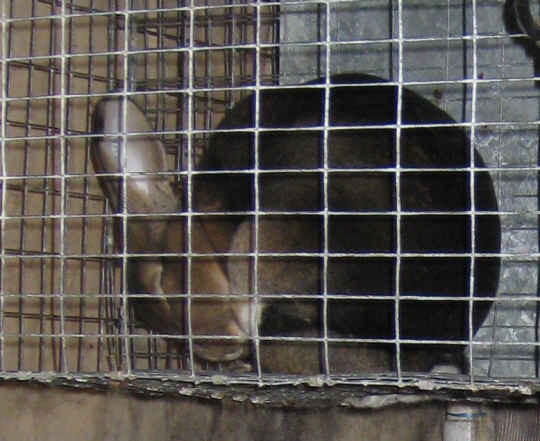
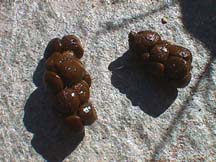
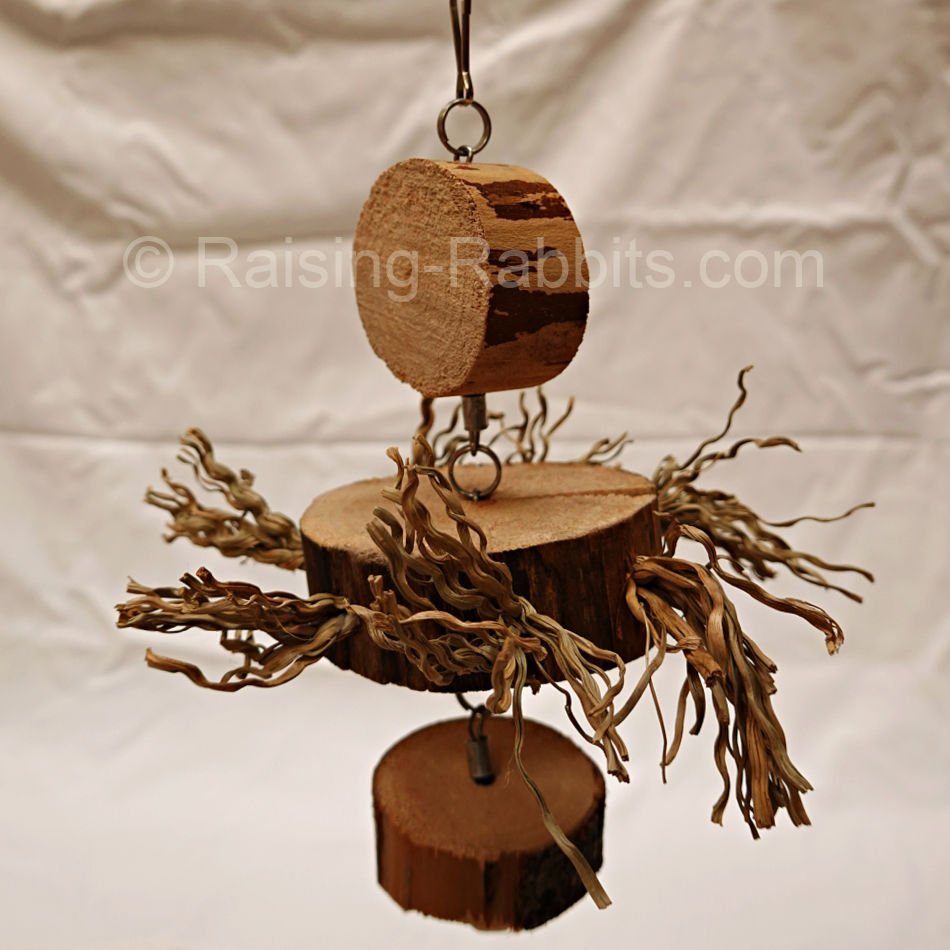
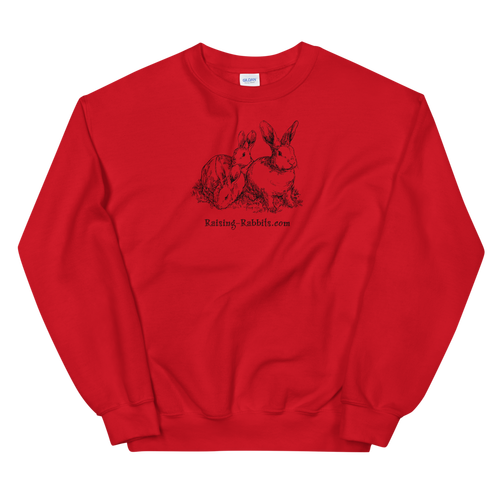

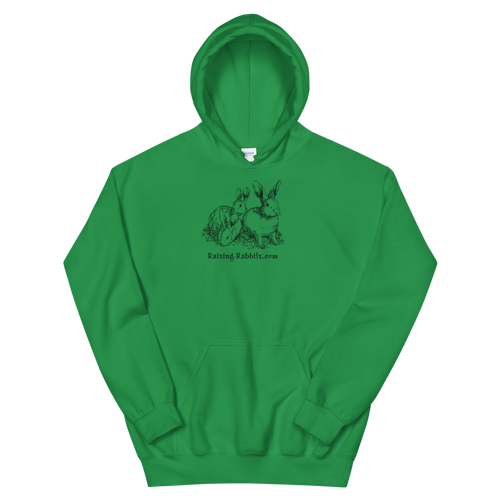
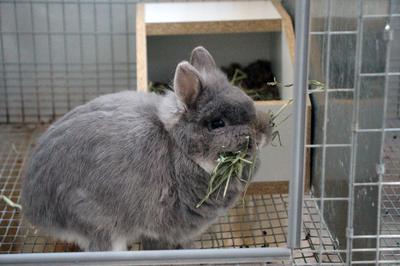
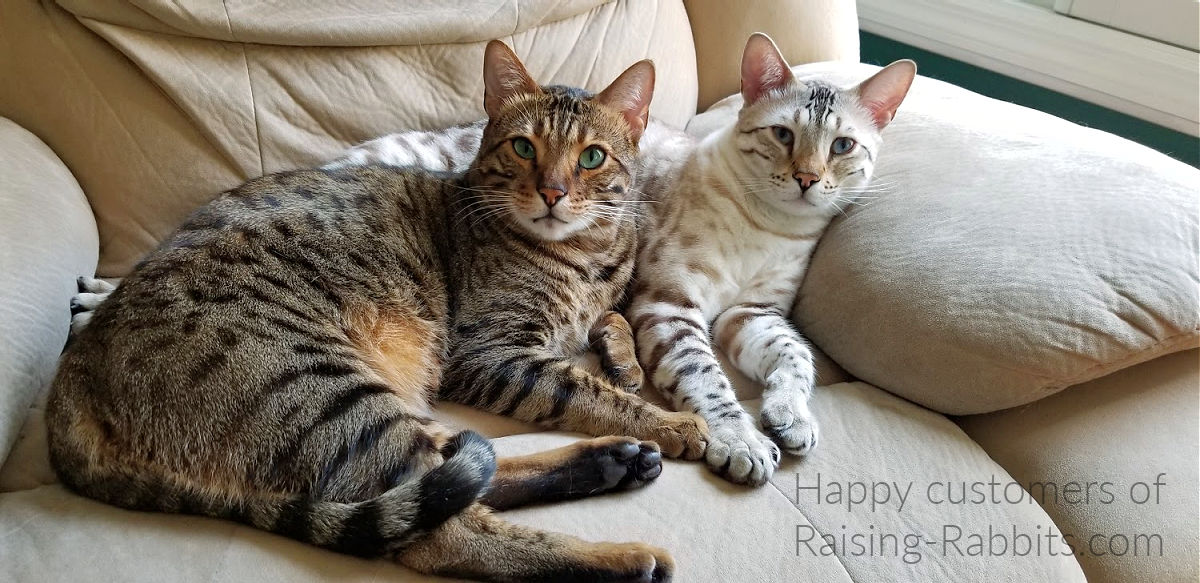
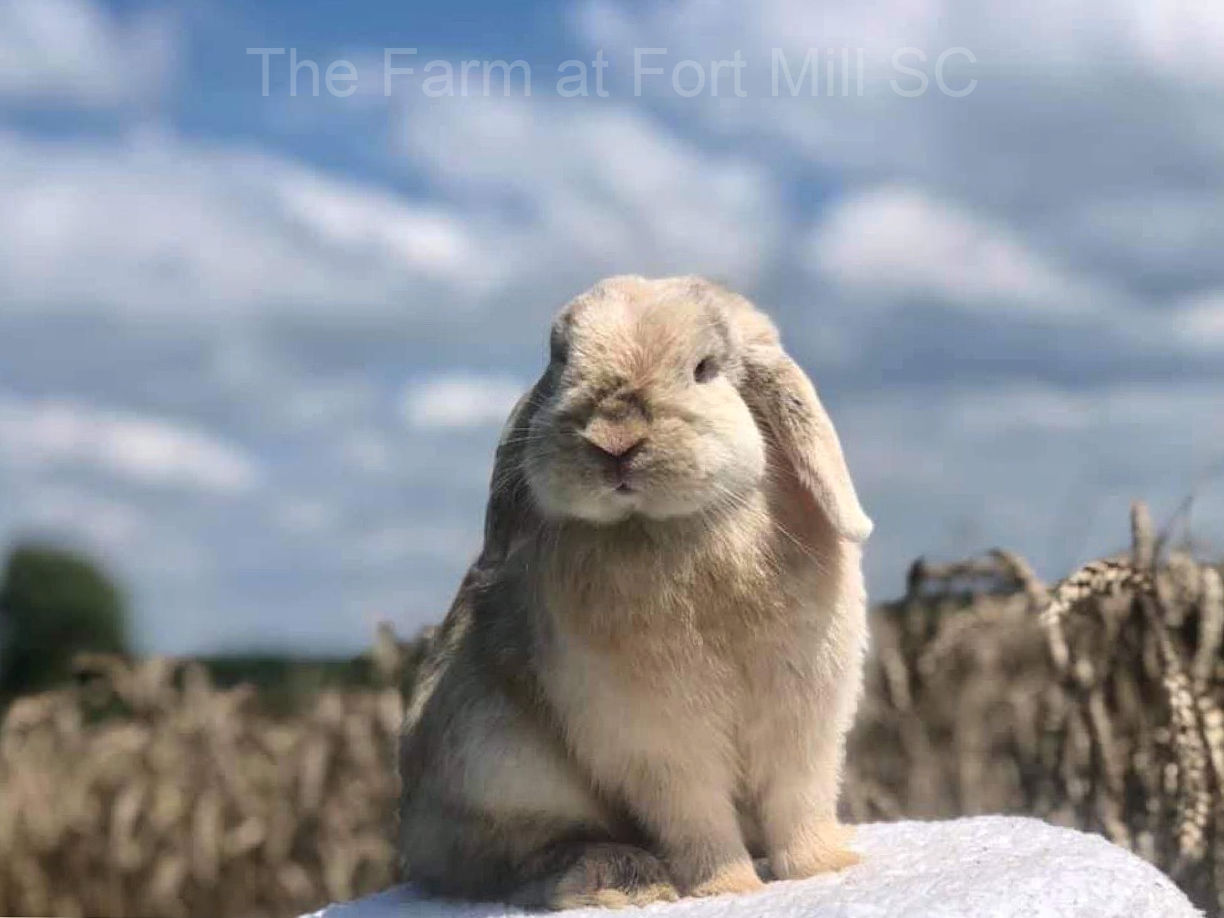
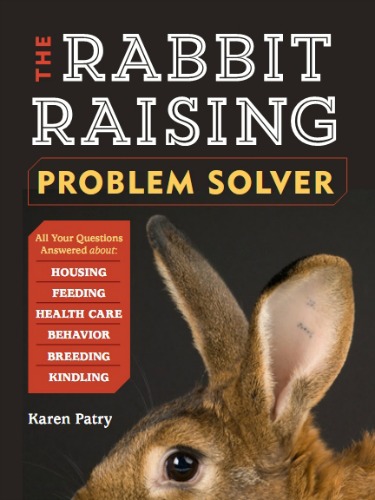

New! Comments
Have your say about what you just read! Leave me a comment in the box below.